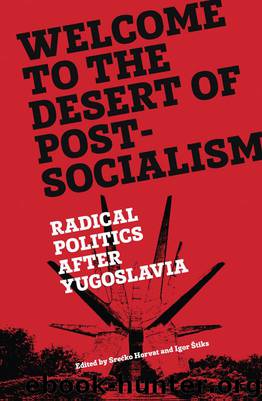Welcome to the Desert of Post-Socialism: Radical Politics After Yugoslavia by Srećko Horvat & Igor Štiks

Author:Srećko Horvat & Igor Štiks [Horvat, Srećko & Štiks, Igor]
Language: eng
Format: epub
ISBN: 9781781686201
Publisher: Verso
Published: 2015-01-05T23:00:00+00:00
It is not so much the suppression of communism as a historical fact, the erasure of the communist past with all its intellectual and political complexity from the historical consciousness of post-communism, that evokes Nancy’s indignation and concern, but rather the immense ignorance with which the post-communist world refuses to wonder about this past and its afterlife, or to ask: ‘Why did this all happen?’ Nancy sees in this the true, almost epochal stupidity of the post-communist turn.
Of course, children are not stupid. However, one can make them stupid, or, more precisely, one can educate them for stupidity. In this respect, a hundred years ago, Freud wrote of intellectual inhibitions that culture implants in its pupils through education to make them more obedient and compliant. He differentiated three types of such thought-blockage – the authoritarian, the sexual and the religious – to which correspond three ‘products of education’, namely the good subjects, the sexually inhibited and religious people. He understood these forms of intellectual atrophy (Verkümmerung), as he also called it, as effects of Denkverbot, a ban imposed on men and women in their childhood, a ban on thinking about what was most interesting to them. In Freud’s time, it was above all the suppression of sexuality that had become the self-evident task of education. Once the Denkverbot was successfully implemented in the realm of sexuality, it was extended to other spheres of life, becoming in this way the most important character trait of the whole personality.
What was at that time sexuality has become, in the world of post-communism, politics itself. While the children of communism are virtually encouraged by their educators to liberate themselves sexually and to come out, as loudly as possible, with their hitherto suppressed sexual identities, to embrace unconditionally all secular values, and to become (instead of good subjects of the totalitarian state) self-conscious, free acting members of a democratic civil society, their liberated intellect seems to have no business being in the realm of the political. It is as though there is nothing there it can wonder about. As though all political questions have been correctly answered long ago; as though the only thing left to think about is how properly to implement these answers, how to imitate, as truly as possible, the pre-given role models and how to obediently follow the wise word of the guardian. It seems that the well-known dialectic of enlightenment, now from its political side, has caught up with the world of post-communism. From being an education for maturity and responsibility that had been implemented to serve the new power, it has become an education for political stupidity. It has turned Kant’s ideal upside down and puts its trust in precisely those people who are not able to use their intellect without guidance from another. Thus, the stupidity that Nancy ascribes to the post-communist turn is actually an effect of this Denkverbot that has been imposed on the political ratio of post-communism. It is above all in a political sense
Download
This site does not store any files on its server. We only index and link to content provided by other sites. Please contact the content providers to delete copyright contents if any and email us, we'll remove relevant links or contents immediately.
| Arms Control | Diplomacy |
| Security | Trades & Tariffs |
| Treaties | African |
| Asian | Australian & Oceanian |
| Canadian | Caribbean & Latin American |
| European | Middle Eastern |
| Russian & Former Soviet Union |
The Secret History by Donna Tartt(16608)
The Social Justice Warrior Handbook by Lisa De Pasquale(11485)
Thirteen Reasons Why by Jay Asher(7782)
This Is How You Lose Her by Junot Diaz(5753)
Weapons of Math Destruction by Cathy O'Neil(5029)
Zero to One by Peter Thiel(4817)
The Myth of the Strong Leader by Archie Brown(4785)
Promise Me, Dad by Joe Biden(4440)
Stone's Rules by Roger Stone(4412)
Beartown by Fredrik Backman(4403)
How Democracies Die by Steven Levitsky & Daniel Ziblatt(4392)
The Fire Next Time by James Baldwin(4336)
100 Deadly Skills by Clint Emerson(4070)
A Higher Loyalty: Truth, Lies, and Leadership by James Comey(4024)
Rise and Kill First by Ronen Bergman(4008)
The David Icke Guide to the Global Conspiracy (and how to end it) by David Icke(3875)
The Farm by Tom Rob Smith(3869)
Secrecy World by Jake Bernstein(3773)
The Doomsday Machine by Daniel Ellsberg(3725)
